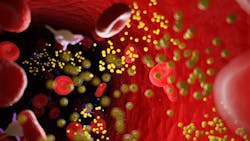The novel agent efgartigimod (EFG) improved platelet counts for more than half of the patients with immune thrombocytopenia (ITP) who received the drug in the phase III ADVANCE IV trial, according to results presented at the 64th annual meeting of the American Society of Hematology in New Orleans.
Already approved by the Food and Drug Administration for the treatment of myasthenia gravis, EFG (Vyvgart, Argenx) is an antibody fragment that reduces immunoglobulin G levels, allowing platelet numbers to increase.
More than half (51.2%) of patients who received EFG met criteria for response (consecutive visits at least 7 days apart, platelet levels greater than 30,000 platelets per microliter, and improvement in the absence of bleeding events) compared to 20% of patients who received placebo in the double-blinded trial.
The study’s primary endpoint was the number of participants who maintained. Secondary endpoints included, among others, the number of bleeding episodes and the proportion of participants who had sustained platelet levels above 50,000 for at least six of the final eight weeks of the study.
In addition, more patients in the EFG arm met the primary endpoint. At 24 weeks, 21.8% of participants treated with EFG, compared with 5% of those who received a placebo, met the primary endpoint of a platelet level of more than 50,000 per microliter during weeks 19 through 24.
For the study, 131 patients in six countries were enrolled. Participants had long-standing, severe ITP with a median time since diagnosis of 4.57 years, and a baseline median platelet count of 17,000 per microliter. The patients were also heavily pretreated, with more than two-thirds (67.2%) having at least three prior ITP therapies. Patients randomly received IV infusions of either EFG or a placebo for 24 weeks at a ratio of 2:1
EFG was generally well tolerated. Adverse events (AEs) including bruising, headaches, and blood in urine were roughly equal in both groups. Serious AEs were reported in 8.1% of the EFG group and 15.6% of the placebo group. None were considered to be treatment-related.
The patients who received EFG will be followed for a minimum of 2 years to continue to evaluate safety and long-term platelet response.

